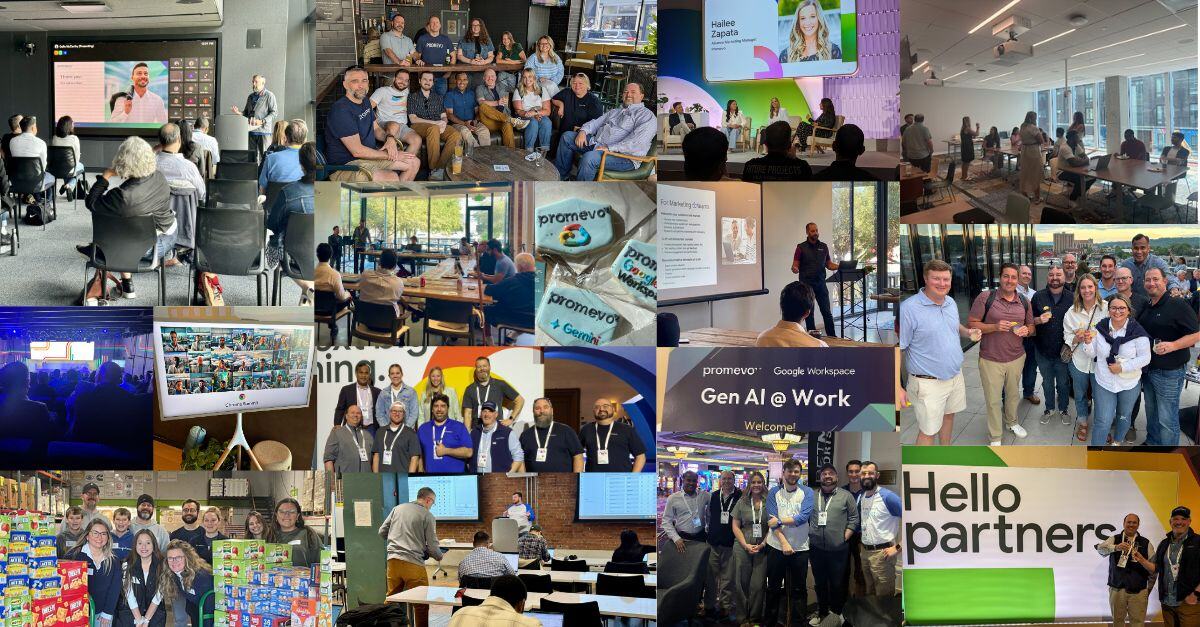3 min read
What Makes Promevo Different From Other Google Premier Partners?
When it comes to finding the right Google Premier Partner, you can’t afford to settle for anyone who just checks the boxes. You need a partner who...
When companies begin their AI journey, one of the first questions that arises is whether every department should use the same AI tool. It seems convenient to deploy a single tool across the board, but not all teams have the same needs. Departments like marketing, IT, and HR face different challenges, work with varying data, and have unique goals.
This blog will explore how to evaluate your company’s AI readiness, select the right AI tools for each team, and introduce Google’s AI assistant, Gemini, as a flexible solution for many different departments.
Before deciding which departments need access to AI tools, you’ll want to assess the readiness of your organization and its individual teams. Not every department may be equally prepared to integrate AI into their workflows, so a comprehensive review is crucial.
Start by evaluating your overall digital infrastructure and leadership’s commitment to AI adoption. Does your company already leverage data-driven tools? Are team members open to adopting new technology?
Leadership should signal strong support for AI initiatives, creating a culture that embraces the benefits of artificial intelligence. Without executive buy-in, your teams may struggle to see the value and feel hesitant to adopt the tools.
Keep in mind that a lot of platforms are already integrating AI into their capabilities. For example, Google recently made Gemini AI available to all Google Workspace Business and Enterprise plans. So, even if your organization isn't fully ready for AI, you'll still want to develop an organizational strategy for deploying and managing these tools sooner rather than later, and starting with one department rather than the entire company can streamline this process.
Departments that are ready to embrace AI typically have an AI champion — a team member who can guide the adoption process and serve as a resource for other employees. These teams are usually tech-savvy and have clearly defined use cases that AI can enhance.
Additionally, support and feedback channels must be in place to smooth the AI adoption process. Teams with structured feedback systems and the ability to offer technical assistance are more likely to succeed with new tools like AI and may be prime candidates for an AI pilot.
Determining the right AI tool for each department requires a strategic approach. Leadership should consider several key factors to ensure the chosen solution aligns with each team’s specific needs and goals.
Start by pinpointing specific use cases that AI can address within each department. Collaborate with team leaders to identify common tasks that can be enhanced or automated through AI. This involves engaging in discussions about current pain points, operational inefficiencies, and areas where AI could drive productivity.
Establishing clear goals helps align the AI solution with the team’s objectives. For instance, marketing may seek tools for content generation, while sales teams might look for AI solutions to analyze customer data and predict trends.
Security should be a top priority when selecting AI tools. Departments that handle sensitive client data, such as finance and HR, need AI solutions with robust security features. Evaluate the security protocols of potential tools to ensure they comply with industry standards and regulations.
Understanding the data management policies, encryption methods, and user access controls can help safeguard your organization’s information. Having secure AI tools not only protects data but also builds trust among team members who may be hesitant to adopt new technology due to privacy concerns.
Beyond use cases and security, consider how well an AI tool integrates with existing software and processes.
Evaluate its compatibility with the tools your teams are already using. A seamless integration reduces disruption and encourages adoption, as team members can continue to use familiar systems while benefiting from AI enhancements.
Additionally, assess how easy it is to train employees on the new system, as a user-friendly interface and comprehensive training resources can significantly boost the likelihood of successful implementation.
If your organization uses Google Workspace, then you already have access to Gemini, Google's generative AI assistant.
This powerful tool enables teams to leverage advanced capabilities for a variety of tasks. Its adaptability makes it suitable for teams in marketing, IT, finance, and more. By leveraging Gemini, organizations can tap into AI's potential to automate mundane tasks, analyze data, and generate insights, freeing up employees to focus on strategic initiatives.
Gemini excels in several common use cases that will resonate with teams across your organization.
For instance, marketing teams can use Gemini for content generation, helping to create blog posts, social media updates, and email campaigns efficiently. IT departments, on the other hand, can benefit from its coding capabilities, enabling faster development and troubleshooting processes.
Gemini also offers data analysis capabilities that can turn raw data into actionable insights, allowing different teams to make informed decisions quickly.
Beyond specialized applications, Gemini provides features that benefit all departments universally. Contextual replies for emails can save time and improve communication efficiency, while content summarization tools help employees digest lengthy reports and PDFs with ease. These features reduce information overload, making it easier for teams to stay organized and focused on their objectives.
By using Gemini, organizations can enjoy a cohesive AI solution that enhances collaboration and efficiency across departments.
As your organization embarks on its AI journey, it’s crucial to assess each department's readiness and determine the right tools that meet their specific needs. While using a single AI tool may seem convenient, evaluating individual use cases, security requirements, and integration capabilities leads to more effective outcomes.
Google’s Gemini offers a flexible solution for various teams, providing capabilities that enhance productivity and streamline workflows. Plus, it's already available to organizations with a Google Workspace Business or Enterprise plan.
Ready to explore the potential of AI for your business? Contact Promevo to set up a Gemini Deployment Workshop. We can help you create an AI adoption roadmap and provide guided training, so all your teams can harness this powerful tool. We can also help you evaluate other AI tools and determine the potential value they can bring to different departments within your organization. Let’s embark on this transformative journey together!
Meet the Author
Promevo is a Google Premier Partner for Google Workspace, Google Cloud, and Google Chrome, specializing in helping businesses harness the power of Google and the opportunities of AI. From technical support and implementation to expert consulting and custom solutions like gPanel, we empower organizations to optimize operations and accelerate growth in the AI era.

3 min read
When it comes to finding the right Google Premier Partner, you can’t afford to settle for anyone who just checks the boxes. You need a partner who...

6 min read
Duet AI and Bard are two popular artificial intelligence solutions offered by Google. However, these products as we know them won't be around for too...

6 min read
Two prominent types of AI — generative AI and predictive AI — are helping businesses achieve distinct goals, each leveraging advanced algorithms in...